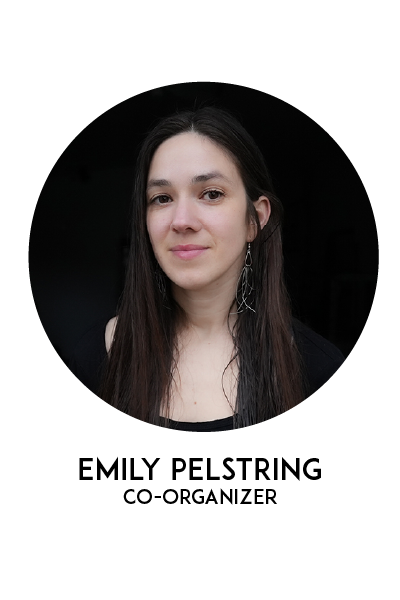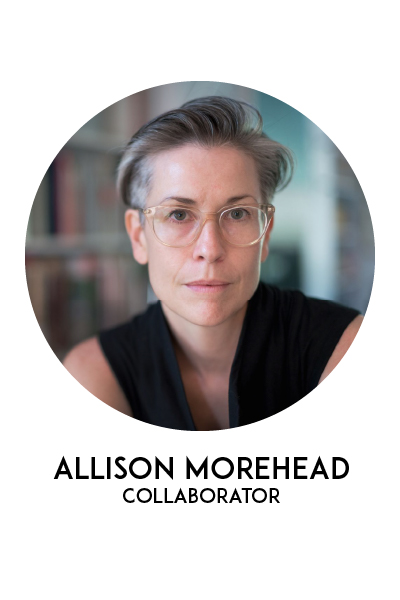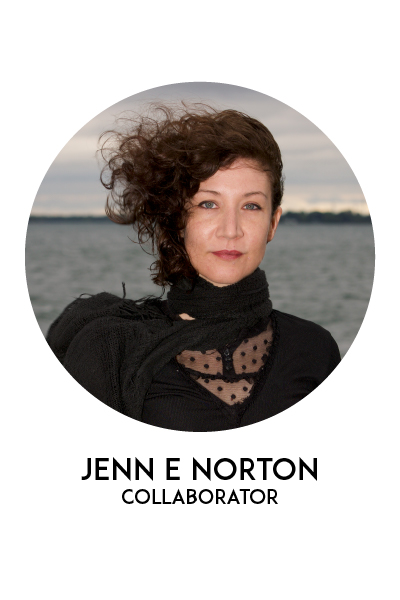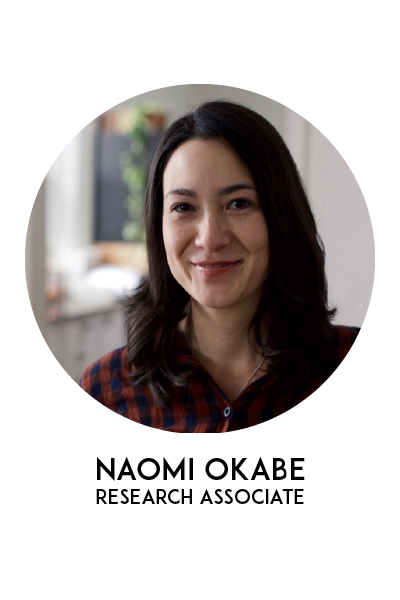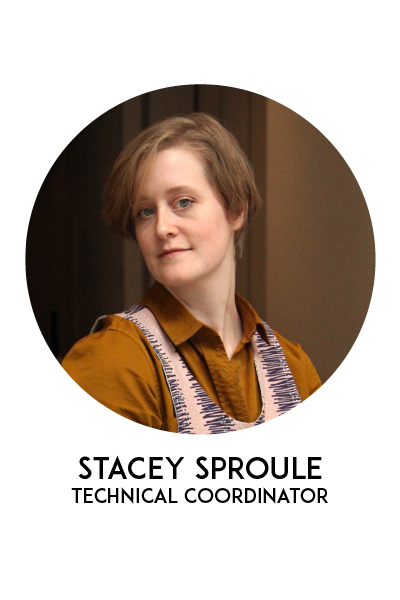
Tamara de Szegheo Lang (she/her) is an adjunct assistant professor in the Department of Film and Media at Queen’s University. She is also the project manager of the Vulnerable Media Lab at Queen’s, which works toward the preservation, migration and remediation of audio-visual production in Canada, especially by marginalized communities including Indigenous peoples, women, and LGBTQ2 people.
Her research takes up queer history, community-based archives, visual culture, and the affective relationships between queer people and the past in curatorial and media spaces. She is currently writing an article on queer sisterhood in 1990s witch reboots with her sister, Naomi de Szegheo-Lang, and teaching a course on the witch in film with Dan Vena.
Emily Pelstring is an artist and filmmaker, and is faculty in the Department of Film and Media at Queen’s University in Kingston, Ontario, Canada. Her creative work has been supported by grants from the Social Sciences and Humanities Research Council, the Canada Council for the Arts, and the Ontario Arts Council. Her work uses surreal and idiosyncratic storytelling to explore links among technology, spirituality, and magic. She incorporates available materials, a variety of animation techniques, and visual tricks such as holography, stereography, and Pepper’s Ghost.
In addition to her solo work, Emily is engaged in two long-term, ongoing artistic collaborations: Inflatable Deities, a duo with Jessica Mensch, and The Powers, a trio with Jessica Mensch and Katherine Kline. Since 2018, The Powers have been working on Sistership TV, a web-based variety show that gathers numerous collaborators and guests to explore questions across ecology, media studies, materialist theory, and feminist theory.
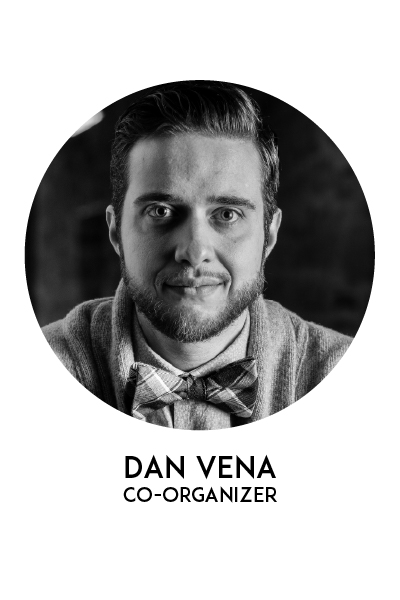
Dan Vena recently completed a SSHRC Postdoctoral Fellow at Carleton University under the supervision of Dr. Laura Horak. He holds a doctorate in Cultural Studies from Queen’s University, where he teaches in Film & Media. He locates his academic interests within the spheres of visual and popular cultures, merging together trans, queer, and feminist approaches to an array of topics including: monsters and horror cinema; Classical Hollywood Cinema; comic book superheroes; and histories of medicine.
He is currently finishing his first manuscript, which revisits classical feminist studies in horror cinema in relation to the new wave of women directors working within the genre. The work is slated to be published by Rutgers University Press.
Continuing his postdoctoral studies, Dan’s next project explores the relationships between medical horror cinema and changing approaches to gender confirmation surgeries. This study is the first to re-read medical horror cinema through the histories of surgical modification and shifting understandings of transgender identity.
Dan’s published work can be found in various journals including, Transformative Works and Culture, Studies in the Fantastic, Graduate Journal for Social Studies, and several anthologies on gender, sexuality, horror cinema, and comic book studies.
Complimentary to his academic work, Dan has also been invited to speak at a number of activist- and community-oriented panels and conferences about trans identities, especially in relation to practices of medical care.
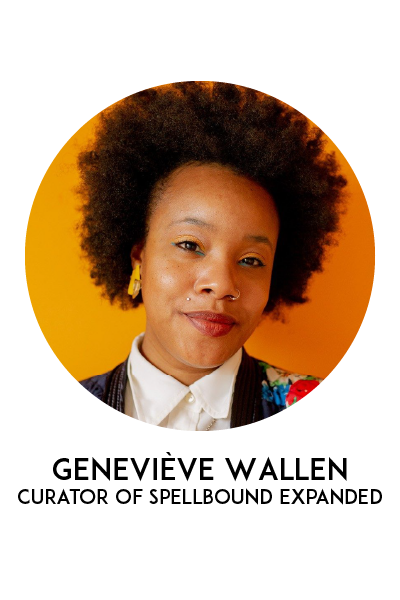
Geneviève Wallen is a Tiohtiá:ke/Montreal and Tkaronto/Toronto based independent curator and writer. Wallen's practice is informed by diasporic narratives, intersectional feminism, intergenerational dialogues, BIPOC alternative futures and healing platforms. Her ongoing research focuses on the notion of longevity as a methodology of ongoing resistance and care work in the arts.
Her most recent curatorial projects include: Made of Honey, Gold, and Marigold (2020), on view at the Robert McLaughlin Gallery in Oshawa and, Little Musings (2020) an online collective correspondence in partnership with MICE Magazine and co-facilitated with artist Eve Tagny. Wallen contributed essays for C magazine; the anthology Other Places: Reflections on Media Arts in Canada, edited by Deanna Bowen; and “Souped Up: Slow Building of Support Networks Through Commensality” in The Politics of Spatial Transgressions in the Arts, eds. Gregory Blair & Noa Bronstein (London: Palgrave Macmillan, 2020).
She is an Exhibition Coordinator at FOFA Gallery, a member of YTB (Younger than Beyoncé), is the co-initiator (with Marsya Maharani) of Souped Up a thematic dinner series conceived to carve spaces for care and support building among BIPOC curators and cultural workers, a member of the Black Curators Forum, and an advisory member for the BLACK PORTRAITURE[S]: Toronto, Absent/ed Presence conference (BPTO).
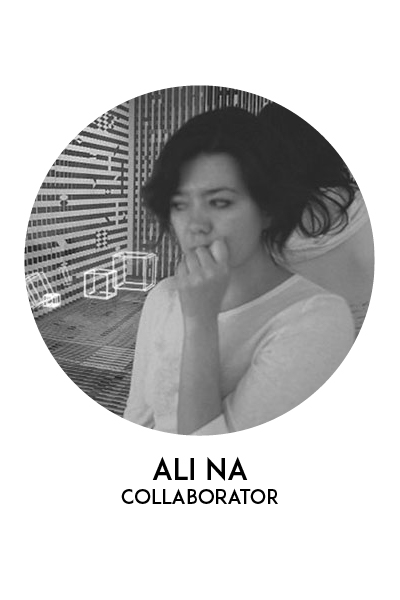
I am an Assistant Professor in the Department of Film and Media at Queen’s University.
As a media scholar working at the intersections of race, queer, and feminist studies, my research focuses on how media performances define and defy conceptions of Asian/Asian diasporic bodies. Drawing on transnational cultural histories, I theorize resistance, complicity, and ambivalence in new border crossings facilitated by digital media.
I approach the social implications of digital media and identity through critical cultural and performance studies. My scholarship and teaching look to contextualize the limits and generative potential in media practices by reaching into the past. I do this by providing cultural and media histories as modes of understanding how the seemingly new and unknown brings with it sedimented pasts.
I am interested in the performance of media technologies – that is the processes and entanglements of media – and performances of self through digital media. As such, my scholarship traverses the areas of digital media, popular culture, and media installation. My research seeks to establish a multidirectional relationship between medium and content. That is, I am interested how tangible technological objects and their processes, embodied practices around media technologies, and the content communicated through media work together. In the digital age, the ideas of media as immaterial, virtual, and transcendent dominate. My work pushes against this impulse by grounding the body, the material, and the haptic.
My publications include “#AzizAnsariToo?: Desi Masculinity in America and Performing Funny Cute” in Women’s Studies in Communication, “Gangnam Eth(n)ic: The Transnational Politics of YouTube” in Liminalities: A Journal of Performance Studies, and “The Fetish of the Click: A Small History of the Computer Mouse as Vulva” in Feminist Media Studies. I am currently working on my first book manuscript Trans Medial Performance: Affirming Asian/American Femininity Otherwise.
Allison Morehead (she/they), Associate Professor of Art History and Cultural Studies at Queen's University, works at the intersection of the arts, humanities, and human sciences, focusing on modern art’s entanglements with the psy-sciences and medicine, and in particular the representations, appropriations, and creative practices of gendered, neuro-diverse, and racialized peoples.
Morehead’s first book, Nature’s Experiments and the Search for Symbolist Form (PSUP, 2017), received the Meiss/Mellon Author’s Award from the College Art Association and was a finalist for the Modernist Studies Association First Book Prize. Recent projects include the SSHRC-funded, “Doing Medical Humanities with Art, Non-Art, Objects, and Things,” an interdisciplinary workshop for the critical medical humanities, and the ongoing SSHRC-funded, “Edvard Munch, Modernism, and Medicine,” an international and multi-disciplinary collaboration that houses research on such disparate topics as occult vegetarianism, caregiving/taking, medical patronage, and constructions of Nordic whiteness. A long engagement with the art practices of mediums in relation to both the occult and the psy-sciences brings Morehead to the Witch Institute.
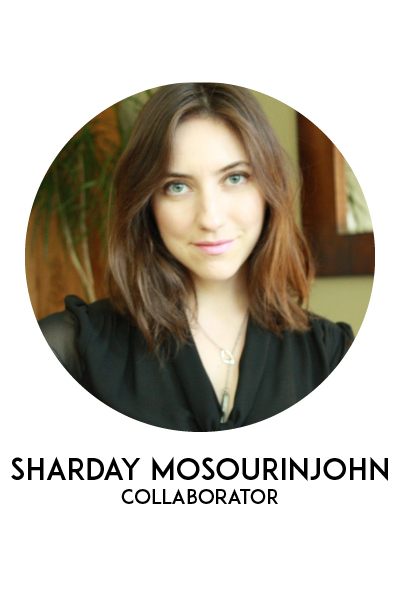
Dr. Mosurinjohn is an Assistant Professor of Contemporary Religious Context at Queen's University and a Collaborator on this project. She studies the discursive construction of spirituality and religion as well as concepts of nonreligion and secularity.
Specific interests include the study of "new religious movements" (NRMs), ritual, and religion and/as media. Her broad interest in the material turn touches on contexts of contemporary (especially conceptual) art; museums; everyday aesthetics; digital contexts (eg. social media; surveillance cultures), and affect. Her major line of research continues to be about boredom and spirituality—taking the modern concept of boredom as a spiritual crisis as a heuristic through the late modern context of choice and information overload.
Jenn E Norton is an artist using time-based media to create immersive, experiential installations that reframe familiar objects, landscapes, and activities as fantastical, dreamlike occurrences. Using stereoscopic, interactive video, animation, augmented reality, sound, and kinetic sculpture, Norton’s installations explore the blurring boundaries of virtual and physical realms. Often using video as a starting point within her process, Norton’s imaginative video compositions of disjunctive imagery are bound together in post-production, using a combination of pre-cinema and contemporary display technologies. Norton's recent animations and augmented reality apps draw upon her interest in the ways in which information is exchanged between animals, plants, and technology.
Current areas of research within Norton's work explore the use of parallel uses of metaphor in physics and art, as a point of conceptual genesis, poetic practice, and communicative device. Recent screenings and exhibitions include her solo show at ELLEPHANT (Montreal), the International Short Film Festival Oberhausen, the International Symposium on Electronic Art (ISEA), Hybrid Art Fair, in Madrid, Spain, where Norton was awarded Best Exhibition, and the online feature of the Art Toronto 2020 fair, which featured Norton's augmented reality work, Eros' Kiss, the first AR Commission for a North America art fair. She is currently a PhD candidate in Visual Arts at York University.
Jenn created the iridescent animation for the Witch Institute’s website.
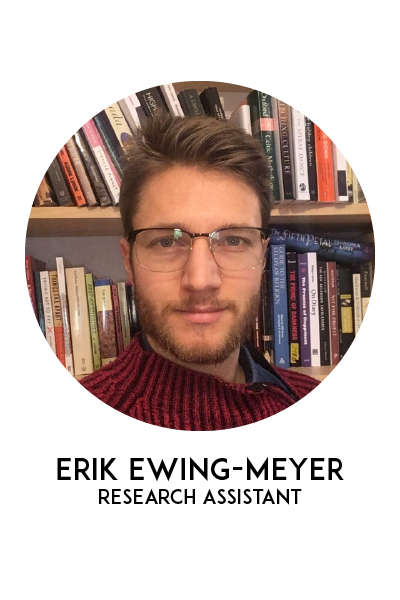
Erik Ewing-Meyer is a PhD student in Cultural Studies and a Research Assistant for the Witch Institute. He has a diverse academic background. With a CEGEP degree in Liberal Arts, a BA in English & Creative Writing, and an MA in Religious Studies, he has built up a flexible approach to thinking through different experiences, methods, and worldviews.
His MA major research project used autoethnographic vignettes to explore the presence and function of academics’ spirituality within the cognitive science of religion. And as a second-generation Pagan, he is currently working on a project that will combine autoethnography with ethnography of those raised in minority, metaphysical religious households. He is a creature with two heads, frequently looking for ways to break from arcane academic erudition in order to incorporate creative writing, music, silliness.

Jhordan Layne is a Doctoral Candidate at Queen’s University in the English Department on Anishinaabe and Haudenosaunee land. He earned his Bachelor’s degree in English and French Literature at Western University. At McMaster university he received his Master’s degree in English, and his Master’s Thesis, titled Our Words Are Brick and Mortar: Masculine Reconstructions of Home and Community in Windrush Era West Indian Migrant Literature, was supervised by Dr. Daniel Coleman. His dissertation project is a transhistorical exploration of literary representations of obeah from the 18th century to the contemporary period, supervised by Dr. Chris Bongie.
He comes to witchcraft studies through his research on obeah and Afro-Caribbean folk religions and their use to challenge colonial domination through resisting Enlightenment epistemologies that underpinned slavery in Jamaica.
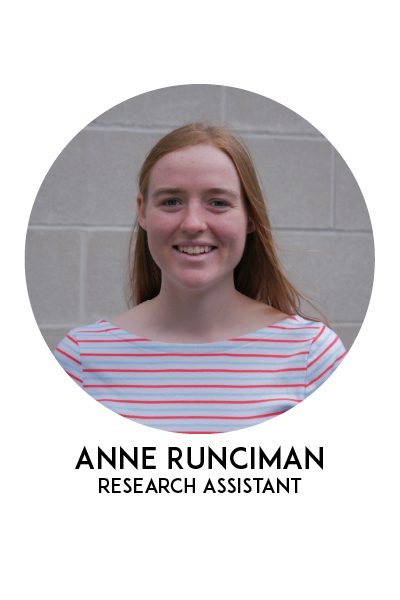
Anne Runciman is a master's student in the Screen Cultures and Curatorial Studies program at Queen’s University. Her research focuses on community experience in atypical cinematic presentation.
Brandon Hocura is a writer, filmmaker, and archivist. As Founder and Creative Director of Séance Centre, his curatorial work focuses on archival reissue projects, new electronic music, and experimental publications. In 2017, he directed “The Lake Sutra”, a short film focusing on the influence of landscape on the work of Canadian musician Beverly Glenn-Copeland. His passion for music has taken him across the globe as an artist, DJ, and researcher.
Naomi Okabe is a writer, filmmaker, and producer. As co-owner and managing director of Séance Centre, she co-curates and oversees development and production for all of their vinyl, print, and film projects. Her short documentary “Tiny Tracks” premiered at the Hot Docs Canadian International Documentary Festival in 2016, and she is currently in post-production on “In Good Hands”, a documentary exploring gender roles and the meaning of good work.
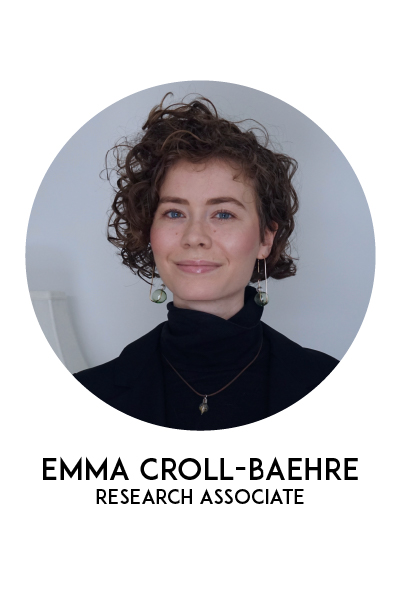
Emma Croll-Baehre is from Corner Brook, Newfoundland & Labrador. They completed a BA (Hons) in English Language and Literature with a Minor in Women’s Studies (2014-2018) at the University of Western Ontario. During their time at Western, Emma volunteered with Poetry London, and co-coordinated with their twin the Emergence Queer Arts Festival. Emma then pursued a SSHRC-funded MA in Cultural Studies and Critical Theory at McMaster University (2018-2019). Their Master’s work examined the intersection of queerness, witchcraft and appropriation in contemporary North American culture.
Emma is a Ph.D. candidate in English and Cultural Studies at McMaster University (2019-). Broadly speaking, their Vanier-CGS supported doctoral work considers contemporary twin cultural production in the digital era as queering hegemonic conceptions of embodiment and autonomy. Emma is the current graduate student representative for the CSN-RÉC.
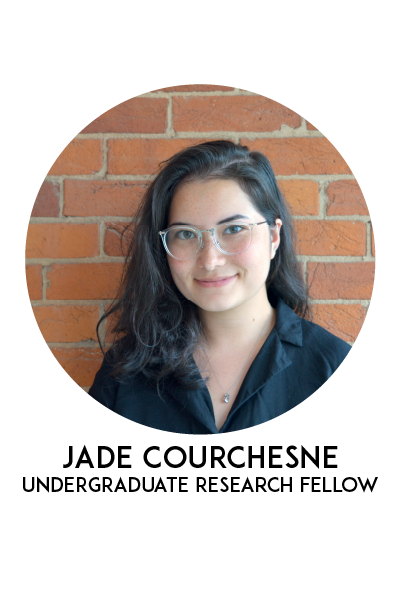
Jade Courchesne is an undergraduate student at Queen’s University working towards a BA in Film & Media. She's interested in studying Asian/ Asian diasporic media representations, with a focus on how ethnic and queer identities interact with stereotypical images as seen on screen. Her current research project, under the Queen's Undergraduate Student Summer Research Fellowship (USSRF), contributes to the existing body of anti-racist literary media through a series of feature articles about "good" film representation, mental health, and Asian Canadian perspectives.
Stacey Sproule is a multi-hyphenate artist, tarot reader, and teacher. Her work focuses on seasons and cycles as well as exploration of mystical tools. She holds a BFA from OCAD in Drawing and Painting, and has exhibited regionally across Ontario.
She has taught at Workman Arts, The Makeden, Stonegate Community Health, Toronto Public Library and The Canadian War Museum. She has worked with the Local Flower Collective since 2018, creating workflows and systems to get local flowers into the hands of consumers and florists.
She sees herself as a blend of the technical and the intuitive.
Stacey maintains the Witch Institute website and socials.

